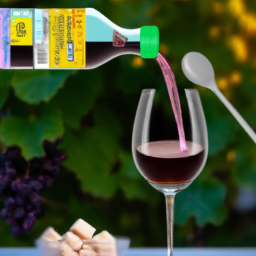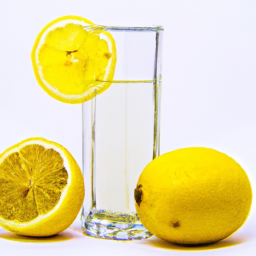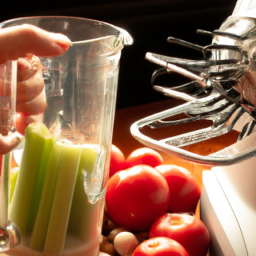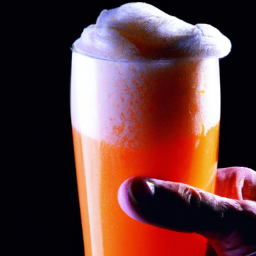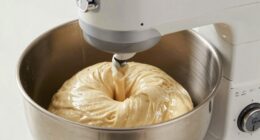As a beginner in winemaking, it is important to understand certain key factors before starting to make your own wine. One crucial aspect to note is the amount of sugar you add to the grape juice.
Sugar is an essential component of wine, as it provides the fuel for the yeast to convert the grape juice into alcohol. However, adding too much or too little sugar can result in a wine that is either too sweet or too dry.
In this article, I will guide you through the process of adding sugar to grape juice for wine. I will explain the factors that affect the amount of sugar you need to add, how to measure the sugar content in grape juice, and how to calculate the amount of sugar to add.
I will also cover the fermentation process, how to monitor sugar levels during fermentation, and the aging and maturation of wine. Finally, I will discuss how to taste and adjust the sweetness of your wine to ensure that it is just right.
Key Takeaways
- The amount of sugar to add to grape juice for wine depends on the type of wine being produced, desired sweetness level, and initial sugar content of the grape juice.
- Gradual mixing of sugar ensures even distribution throughout the grape juice.
- Sweetness level must be balanced with acidity to achieve overall flavor balance.
- Testing and adjusting sweetness through tasting and adding small amounts of sugar or grape concentrate is important for achieving the desired flavor profile.
Understanding the Importance of Sugar in Winemaking
Let’s dive into why sugar is the ultimate ingredient when it comes to crafting a delicious bottle of wine. As a winemaker, I know that the importance of sugar in winemaking can’t be overstated.
The ripeness of the grape is directly related to the amount of sugar it contains. This is why it’s important to harvest the grapes at the right time, when they’re fully ripe and have reached their maximum sugar content.
Once the grapes have been harvested, the fermentation process begins. This is where the sugar in the grapes is converted into alcohol through the process of yeast fermentation. The length of time the wine is left to ferment will also affect the final sugar content of the wine.
Understanding the importance of sugar in winemaking is crucial for producing a high-quality product. Now, let’s take a look at the factors that affect the amount of sugar to add.
Factors That Affect the Amount of Sugar to Add
When deciding how much sugar to add to grape juice for wine, there are several factors that must be considered. As a winemaker, I must take into account the type of wine I’m making, the grape variety being used, and the desired level of sweetness.
Each of these factors plays a crucial role in determining the amount of sugar needed to create a balanced and delicious wine.
Type of Wine
To make a full-bodied red wine, you’ll want to add more sugar to your grape juice than you would for a lighter white wine, much like how a thick coat of paint creates a bolder color than a thin layer. The amount of sugar added to a grape juice is dependent on the desired outcome of the wine, and the type of wine being produced is a significant factor. When considering wine pairing and flavor profiles, it’s essential to understand that the sweetness of a wine can affect how it tastes with different foods.
Different types of wines require varying amounts of sugar to achieve the desired sweetness level. For example, a red wine such as a Cabernet Sauvignon typically requires more sugar than a white wine like a Chardonnay. The table below illustrates the sugar content in grams per liter for different types of wine. Keep in mind that while these are general guidelines, winemakers can adjust the sugar content to their specific preferences.
| Wine Type | Sugar Content (grams per liter) |
|---|---|
| Red | 10-35 |
| White | 0-15 |
| Rosé | 5-20 |
| Sparkling | 0-35 |
| Fortified | 90-120 |
Understanding the type of wine being produced is crucial in determining the amount of sugar to add to grape juice. However, it’s not the only factor to consider. The grape variety also plays a significant role in determining how much sugar is needed to achieve the desired flavor profile.
Grape Variety
You can enhance the flavor of your wine by considering the grape variety used in its production. Grape variety selection plays a crucial role in determining the flavor profile of wine.
Different grape varieties have distinct characteristics that impact the taste, aroma, and color of the wine. For instance, if you want to produce a red wine, you may choose from grape varieties such as Cabernet Sauvignon, Merlot, or Pinot Noir, each with its unique flavor profile. Similarly, if you want to produce a white wine, you may choose from grape varieties such as Chardonnay, Sauvignon Blanc, or Riesling, each with its unique flavor profile.
Understanding grape variety selection is essential to produce a wine that meets your desired flavor profile. Different grape varieties produce different flavors, and it’s essential to choose the right grape variety to produce the desired taste.
In addition, the climate and soil conditions where the grapes are grown also affect the flavor of the wine. Therefore, it’s vital to choose the right grape variety based on the climate and soil conditions of your region. With the right grape variety selection, you can produce a wine that has the desired flavor profile.
Transitioning into the subsequent section, the next step is to determine the desired level of sweetness in the wine.
Desired Level of Sweetness
If you’re like most wine drinkers, finding the perfect balance of sweetness in your glass can be a challenge. Sweetness preferences can vary widely between individuals, and even between different types of wine. When it comes to making wine at home, the desired level of sweetness is a crucial factor in determining how much sugar to add to grape juice.
Balancing acidity is also an important consideration when determining the desired level of sweetness in your wine. As a general rule of thumb, the sweeter the wine, the lower the acidity should be. To help you determine the appropriate level of sweetness, consider the following table:
| Level of Sweetness | Sugar (grams per liter) | Acid (grams per liter) |
|---|---|---|
| Bone Dry | 0-5 | 4-8 |
| Dry | 5-15 | 5-7 |
| Off-Dry | 15-30 | 6-8 |
| Semi-Sweet | 30-50 | 6-7 |
| Sweet | 50-120 | 5-6 |
When deciding on the desired level of sweetness for your wine, keep in mind that it’s always easier to add more sugar later on than it is to remove it. In the next section, we’ll explore how to measure the sugar content in grape juice to help you determine how much sugar to add for your desired level of sweetness.
Measuring Sugar Content in Grape Juice
Feeling unsure about the sweetness level of your grape juice? Try using a hydrometer to measure the sugar content and ensure your wine turns out just right! Measuring instruments like a hydrometer can help you determine the sugar content, or Brix level, of your grape juice.
Here are three simple steps to follow:
- Fill a tall, narrow container with your grape juice sample.
- Place the hydrometer in the juice, making sure it floats freely and doesn’t touch the sides of the container.
- Read the Brix level where the hydrometer meets the juice level.
Using a sugar conversion chart, you can then calculate the potential alcohol level of your wine based on the Brix reading. Once you know the sugar content of your grape juice, you can move on to calculating the amount of sugar to add to achieve your desired level of sweetness.
Determining the sugar content of grape juice is an important step in wine making. Using a hydrometer and sugar conversion chart can help you accurately measure the sugar content and potential alcohol level. With this information, you can confidently move forward in the wine making process and calculate the amount of sugar needed to achieve your desired sweetness level.
Calculating the Amount of Sugar to Add
Ready to take your wine making to the next level? Let’s dive into calculating the precise amount of sweetness needed for your perfect blend.
Calculating accuracy is key to achieving the desired sweetness level in your wine. The amount of sugar to add depends on the initial sugar content of your grape juice and the final alcohol content you want to achieve.
To calculate the required amount of sugar, you’ll need to use a hydrometer to measure the specific gravity of your grape juice before and after fermentation. The difference between these two measurements will give you the alcohol content of your wine. From there, you can use an online calculator or a sugar-to-alcohol conversion chart to determine the amount of sugar to add to achieve your desired sweetness level. Keep in mind that alternative sweeteners, such as honey or agave syrup, can also be used to adjust sweetness levels in your wine.
Now that you’ve calculated the precise amount of sugar to add to your grape juice, it’s time to move on to the next step of the wine making process: adding the sugar.
Adding Sugar to Grape Juice
Get ready to take your taste buds on a wild ride as you add just the right amount of sweetness to your grape concoction, bringing out flavors you never knew existed. Adding sugar to grape juice is an essential step in the winemaking process, and it can make all the difference in the final product. Here are four things to keep in mind when adding sugar to your grape juice:
-
Benefits of sugar: Sugar not only adds sweetness to your wine, but it also helps to increase the alcohol content and improve the texture and mouthfeel. It also helps to balance out the acidity of the grapes, making the wine taste smoother and more well-rounded.
-
How much sugar to add: The amount of sugar you add will depend on several factors, including the ripeness of the grapes, the desired sweetness level of the wine, and the starting gravity of the juice. A general rule of thumb is to add one pound of sugar per gallon of juice to increase the alcohol content by approximately 1%.
-
Alternatives to sugar for winemaking: If you’re looking to avoid using sugar, there are several alternatives you can try, including honey, agave nectar, or grape concentrate. Keep in mind that each alternative will have its own unique flavor profile and may require different amounts to achieve the desired sweetness level.
-
Mixing the sugar: To ensure that the sugar is evenly distributed throughout the grape juice, it’s best to mix it in gradually, stirring well after each addition. Be sure to take a gravity reading after each addition to track the changes in alcohol content.
As you add sugar to your grape juice, you’re one step closer to creating a delicious wine. But before the fermentation process begins, there are a few more important steps to take.
Fermentation Process
Now we come to the exciting part: the fermentation process. It’s during this stage that the yeast consumes the added sugar, converting it to alcohol and carbon dioxide.
As the yeast breaks down the sugar, it produces carbon dioxide, which can be seen as bubbles rising to the surface of the juice.
This process typically takes about one to two weeks, depending on the temperature and the amount of sugar added.
Yeast Consumption of Sugar
It’s amazing how much yeast devours the sugar in grape juice during the fermentation process! Yeast nutrition plays an essential role in the process, as it needs specific nutrients to function correctly.
Yeast consumes sugar through a process called sugar metabolism, where it converts sugar into alcohol and carbon dioxide. During the fermentation process, yeast consumes sugar at a rapid pace, producing alcohol and carbon dioxide as byproducts.
As yeast consumes sugar, it releases energy, which it uses to fuel its metabolic processes, such as growth and reproduction. The carbon dioxide produced by yeast during fermentation plays an essential role in wine production, as it helps to push out oxygen from the fermentation vessel, preventing oxidation.
With the yeast consuming so much sugar, it’s crucial to add the right amount of sugar to grape juice to achieve the desired alcohol content.
CO2 Production
The production of CO2 during fermentation is impressive, and it can reach levels as high as 1.5 to 2 times the volume of the original grape juice. This process is a crucial part of wine-making because it helps to create the desired carbonation levels in the final product.
However, it’s important to consider the impact of CO2 emissions on the environment and the wine-making industry’s carbon footprint. Winemakers can take steps to minimize their carbon footprint, such as using renewable energy sources and reducing waste.
Monitoring sugar levels during fermentation is also essential to reducing CO2 emissions. By carefully controlling the amount of sugar added to the grape juice, winemakers can ensure that the yeast consumes all the sugar, minimizing the amount of CO2 produced during fermentation. This not only helps to reduce the wine-making industry’s carbon footprint but also ensures a more consistent and predictable fermentation process.
Monitoring Sugar Levels During Fermentation
To monitor the sugar levels during fermentation, you’ll need to use a hydrometer and take regular readings. This is crucial for ensuring optimal fermentation conditions and for understanding the impact of sugar levels on wine flavor.
Here are three important things to keep in mind when monitoring sugar levels:
-
Take readings at regular intervals: It’s important to take hydrometer readings at the same time each day to get an accurate picture of the fermentation progress. This will help you track changes in sugar levels and determine when the fermentation is complete.
-
Adjust sugar levels as needed: If the hydrometer readings show that the sugar levels are too high or too low, adjustments should be made to ensure optimal fermentation conditions. Adding sugar to grape juice can help increase alcohol content, but too much sugar can result in a wine that is overly sweet.
-
Taste frequently: Tasting the wine during fermentation can give you a sense of how the sugar levels are impacting the wine’s flavor. This can help you make informed decisions about how to adjust sugar levels to achieve the desired taste.
As fermentation nears completion, it’s important to start thinking about aging and maturation. This process can significantly impact the final flavor of the wine, so it’s important to approach it with care and attention to detail.
Aging and Maturation
Now that you’ve successfully monitored your wine’s fermentation process, it’s time to turn your attention to the crucial next step: aging and maturation, where the true magic of winemaking happens.
Aging is the process of storing wine in barrels or bottles for a certain amount of time to allow it to develop complex flavors, aromas, and textures. Barrel aging involves storing wine in oak barrels, which can impart flavors of vanilla, spice, and toast. Bottle aging, on the other hand, involves storing wine in bottles for a prolonged period, allowing it to develop more subtle and delicate flavors.
During the aging process, it’s important to monitor the wine regularly to ensure that it’s developing as intended. Taste the wine periodically to check for any off-flavors or aromas. If you notice any issues, you can make adjustments as necessary.
This leads us to the next step: tasting and adjusting sweetness.
Tasting and Adjusting Sweetness
When tasting your aged wine, you’ll want to pay close attention to the level of sweetness and make any necessary adjustments. This is because the sweetness level can greatly affect the overall balance of flavors in the wine. Too much sweetness can make the wine taste cloying and overwhelming, while too little sweetness can make it taste sour or harsh.
Here are three things to consider when adjusting sweetness:
-
Adjusting acidity: Acidity and sweetness are closely related in wine. If your wine is too acidic, it can make the wine taste sour and unbalanced. To adjust acidity, you can either add a small amount of baking soda or potassium carbonate, or you can blend in a wine that has lower acidity.
-
Balancing flavors: It’s important to balance the sweetness with other flavors in the wine. For example, if your wine has a lot of tannins, you may want to add more sweetness to balance it out. Similarly, if your wine has a lot of fruit flavors, you may want to add less sweetness to let those flavors shine through.
-
Testing and adjusting: The best way to adjust sweetness is to taste the wine and make adjustments as needed. Start by adding small amounts of sugar or grape concentrate, and then taste the wine again. Repeat this process until you’ve achieved the desired level of sweetness. Remember to take notes on the amounts you add so you can replicate the process in the future.
Frequently Asked Questions
What type of grape juice should be used for making wine?
To start, let’s talk about grape juice varieties and sourcing. When it comes to making wine, it’s important to use high-quality grape juice from a reputable source. As for the type of grape juice, that depends on the specific wine you want to make.
Can I use artificial sweeteners instead of sugar in winemaking?
As an AI language model, I can tell you that using artificial sweeteners instead of sugar in winemaking has its pros and cons. While it can reduce the calorie intake, it may affect the taste and overall quality of the wine. Health effects are still being studied.
How long should the fermentation process last?
Ah, the age-old question of how long to let the juice ferment. Well, my dear wine enthusiast, there are a few factors affecting fermentation rate to consider. Choosing the right yeast strain is key, but ultimately, it depends on the desired flavor and alcohol content.
What equipment do I need for measuring sugar content in grape juice?
To measure sugar content in grape juice, I recommend using a refractometer or hydrometer. Sugar alternatives, such as honey or agave, can also be used. These measuring techniques are essential for monitoring the fermentation process and ensuring the desired level of sweetness in the final wine product.
What is the ideal temperature for aging and maturing wine?
The ideal temperature for aging and maturing wine is between 55-65°F with consistent humidity levels. Proper wine cellar design includes insulation, ventilation, and a cooling system to maintain these conditions.
Conclusion
Well, there you have it – the ins and outs of adding sugar to grape juice for wine making.
It may seem like a daunting task, but with the right tools and knowledge, anyone can become a winemaker.
Remember, the amount of sugar you add can drastically affect the taste and alcohol content of your wine, so it’s important to measure and calculate carefully.
As with any skill, practice makes perfect. Don’t be afraid to experiment and try different sugar levels to find the perfect balance for your taste buds.
And always remember, the true beauty of winemaking lies in the patience and dedication it takes to create a delicious and unique product.
So go forth, my fellow wine enthusiasts, and let the sweet nectar of the grape bring joy to your heart and warmth to your soul. Cheers!
